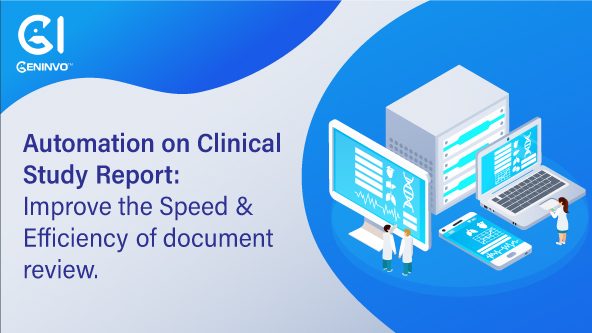Clinical Study Report (CSRs) are critical documents that summarize the findings and results of clinical trials. These reports require a thorough review process to ensure accuracy, compliance, and adherence to the regulatory guidelines. However, the manual review of CSRs can be multiple, time-consuming, resource-intensive, and prone to human errors. Fortunately, automation technologies have emerged as a valuable solution to enhance the speed and efficiency of document review in clinical research. Further, automation is transforming the review process of CSRs, leading to faster turnaround times, and improved overall efficiency.
Automation in Improving the Speed and Efficiency of Clinical Study Report (CSR) Review:
- Automated Text Extraction and Search:
Automation tools are equipped with natural language processing (NLP) capabilities that can extract and analyse the content from CSRs. These tools can automatically identify and extract relevant data, such as study objectives, methodology, adverse events, and statistical analyses. By automating text extraction, reviewers can quickly locate specific information within the document, saving time and effort. DocQC provides different quality control checks to cater to different sections of the CSR, to validate the accuracy and consistency of the data/content.
Additionally, automated search functionalities enable reviewers to conduct comprehensive searches across multiple CSRs, facilitating cross-referencing and data comparison, further improving the efficiency of the review process. DocQC is also built with cross-referencing quality control checks to conduct the search between CSR and relative sources. For example, it checks whether the content of the methodology section is accurately listed as per the Template, Protocol or Statistical Analysis Plan, or whether the references and citations are accurately listed throughout.
- Quality Control and Consistency:
Automation helps ensure consistent review practices and adherence to predefined quality control measures. By implementing automated review workflows, organizations can establish standardized review processes, ensuring that all reviewers follow the same guidelines and evaluation criteria, thus maintaining consistency.
Automation tools can also flag potential errors, inconsistencies, or missing information, allowing reviewers to focus on addressing these issues instead of spending time on routine checks. This streamlines the review process, reduces the risk of oversights, and enhances the overall quality and accuracy of CSRs. Using DocQC, reviewers can spend more quality time on critical thinking and addressing all the flagged issues listed as per quality check reports. With automation tools like DocQC, it also helps to omit ambiguity and human errors in comparison with manual review.
- Regulatory Compliance and Standardization:
Reviewing CSRs for regulatory compliance is a critical aspect of the document review process. Automation tools can assist in identifying and flagging potential non-compliance issues by comparing the content of CSRs against predefined regulatory guidelines and industry standards. This automated compliance check minimizes the risk of overlooking regulatory requirements and ensures that CSRs meet the necessary regulatory criteria.
Furthermore, automation enables the standardization of review practices, ensuring consistency across different reviewers and reducing the chances of subjective interpretations. The AI and ML enabled algorithms in DocQC provide consistency between the results of the CSR reviews.
- Collaboration and Version Control:
Automation facilitates seamless collaboration and version control among reviewers and stakeholders involved in the document review process. Cloud-based platforms allow multiple reviewers to access and review CSRs simultaneously, eliminating the need for manual exchange of documents. Version control features ensure that reviewers work on the most up-to-date version of the CSR, avoiding confusion and reducing the risk of errors resulting from working on outdated information.
Automation also enables real-time tracking of changes and comments, streamlining the review process and enhancing communication and collaboration among team members. With offline reports in DocQC, user can track the changes done in CSR by comparing the downloaded excel reports.
- Enhanced Decision-Making:
Automation empowers reviewers with data-driven insights and decision-making support. Through advanced analytics and visualization tools, automation platforms can generate interactive reports, highlighting key findings, trends, and patterns within CSRs. These insights enable reviewers to make informed decisions and recommendations based on comprehensive data analysis, ultimately enhancing the quality and accuracy of the review process.
DocQC’s user friendly interface brings the analysis of content comparison along with the highlighted key findings and patterns, enabling the reviewers to view the discrepancies and make better decisions and recommendations.
Conclusion:
Automation technologies are revolutionizing the review process of clinical study reports, offering significant improvements in speed, efficiency, and accuracy. By automating text extraction, ensuring regulatory compliance, promoting collaboration, and providing decision-making support, automation tools streamline the review process and enable faster turnaround times without compromising quality. As the field of clinical research continues to embrace automation, the adoption of these technologies will undoubtedly bring about transformative changes, enhancing the overall efficiency and effectiveness of document review in clinical study reports.
Hargun Sethi – Software Development and Business Growth




